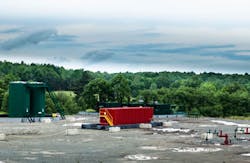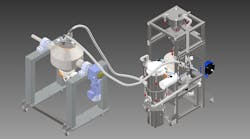Scientists who have been examining earthquakes in Colorado and its neighboring states for about four decades believe that the practice of disposing of wastewater by drilling and injecting it underground may cause seismic activity, the Denver Post has reported.
The claim was made by the U.S. Geological Survey but Colorado officials cautiously expressed doubt about the findings, saying that more research is needed to prove the relationship between earthquakes and fracking wastewater disposal. However, they added that all company permits are being reviewed to evaluate seismic risks, following a 5.3-magnitude earthquake just outside the city of Trinidad last year.
According to the Denver Post, there are about 330 fracking wastewater disposal wells drilled around Colorado. Drilling companies use these disposal wells to dispose of brine water and chemical waste that result from hydraulic fracturing, or fracking, in the production of oil and gas. Over recent years the disposal of fracking waste in underground wells has become more common, since it is considered to be more environmentally friendly than having it dumped in rivers.
RELATED: Fracking wastewater caused earthquakes in Ohio seismologist says
The wastewater report, due to be presented at an American Geophysical Union summit, highlights the need for a debate on disposal wells, said Justin Rubinstein, co-author of the report. This is a risk to society and it needs to be taken into account, he told the Denver Post.
The U.S. Geological Survey stated that the Trinidad earthquake and a similar 5.6-magnitude quake in Oklahoma were both triggered by injections of fracking waste disposal underground. Their research found that there were five quakes of magnitude of at least 3.0 that occurred between 1970 and 2001 in the Raton Basin in northern New Mexico and in southern Colorado. In comparison, between 2001 and 2010 there were 95 quakes of the same magnitude, leading them to the conclusion that oil and gas fracking operations caused the majority, or even all of them. The research discovered that most earthquakes were located within three miles of active disposal wells and those wells contained very large volumes of wastewater.
However, Rubinstein explained that of the 40,000 disposal wells drilled across the U.S., only a small proportion of them are thought to have caused problems. There should be a more detailed analysis of the data so that a better understanding of the issue can be obtained, because if the problem is not addressed it could lead to very serious consequences, he noted.
Colorado Geologic Survey chief Vince Matthews told the Denver Post that state geologists were asked by Colorado’s Oil and Gas Conservation Commission (COGCC) last year to review all permits issued to companies for drilling disposal wells and to assess the seismic risk. So far, 35 of the 330 have been looked into. The commission recommends that operators pay attention even to small quakes and install seismic sensors. Other criteria that they are looking at include whether earthquakes have historically been recorded near a well, the presence of fault lines in the area and the direction of cracks in the rock.


